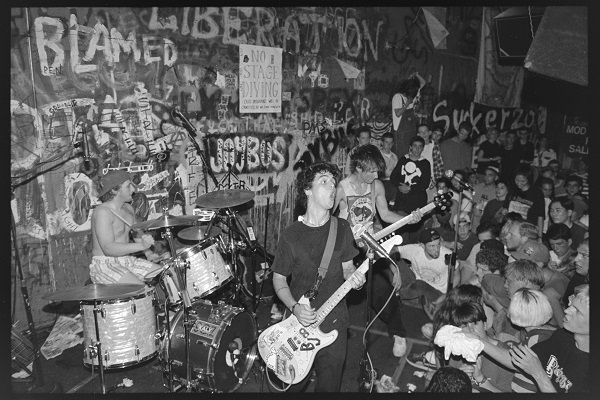
‘Turn It Around’ tells the story of the dynamic East Bay punk community
Corbett Redford spent four years in Green Day’s studio in Oakland, California, sifting through 500 hours of interview footage with 185 musicians to put together “Turn It Around: The Story of East Bay Punk.”
The new documentary, which is executive produced by Green Day, chronicles the rise of the punk music scene in California’s Bay Area and Berkeley’s 924 Gilman Street music collective.
The film — narrated by the godfather of punk, Iggy Pop — features interviews with a long list of influential musicians from the punk world and beyond, including Green Day, Metallica, AFI, Minor Threat, Dead Kennedys, Rancid and many more.
Redford was the perfect guy to direct “Turn It Around.” He went to high school with the members of Green Day and knows the ins and outs of the East Bay punk scene.
Redford spoke with Anne Erickson about the genesis of “Turn It Around,” getting artists such as Iggy Pop and Metallica’s Kirk Hammett involved and why he believes the heart of punk is inclusiveness and community.
Find a full list of screenings for “Turn It Around” via EastBayPunk.com.
You first got to know Green Day in high school. Tell me about those early days.
I was a freshman and they were seniors. I grew up looking up to them, and I saw my first Green Day show in 1991, and it changed my life. I had never seen a phenomenon like that where people who didn’t know each other were coming together when they heard that guitar, and it moved me. I was already a friend, but at that point, I became a fan for life.
How did you get brought in to direct “Turn It Around: The Story of East Bay Punk?”
Billy Joe asked me if I had some old Green Day footage from the early days that I might be able to find. I’ve been a part of the East Bay punk scene for 20 years, so I knew how to find it and actually found a lot more. Then he said, “We’re looking for someone to direct a movie about our early years and how we came up in the scene. Do you know anybody who could do it?” And I said, “Yeah. Me!” He said, “I think you’re right.” A couple of days later, I got the gig.
Iggy Pop does a fantastic job narrating this film. What made him the right person to serve as narrator?
He’s from Ann Arbor, which is kind of a counter-cultural area like Berkeley or San Francisco. He is the godfather punk. He is the guy who started this before punk was punk. He has a great voice and is the godfather punk and was willing to do it, so that was enough for me!
It’s great to see Kirk Hammett from Metallica in this film. A lot of people only think of Metallica in terms of thrash and metal, and not punk. Why did you find it important to include him?
That’s a good question– nobody has asked me that yet. It was very important to me to have him in the film, because he was a local person in the same region that Green Day and Primus grew up.
We all knew that Metallica had this love for punk. They loved the early East Bay punk band Fang. Kirk knew about punk culture, and he was also impacted by the backwards mentality of the area. There were a lot of white supremacists in the region that didn’t like that he was a Filipino kid. This film connects the dots and lets people know that all these huge bands at one time had similar experiences growing up in the same region, so I love Metallica, and I’m really proud that they’re from our region.
Watching the film from start to finish, what makes you most proud?
It’s very localized and goes into the very human aspects about the people in the scene and their stories. They put their differences aside and came together to build something positive, and there are some legendary things that have come out of it. We took a lot of time developing the story and listening to people’s interviews, and with every new interview, we would find new things. Is was very complex and a big responsibility.
What do you hope people take away from “Turn It Around?”
I really hope that people see this movie and see the vibrancy and inclusiveness of that early scene and decide that they want to make something like that happen in their own towns– to reach out to people who are different and create and build things together. I feel it’s important that people see this, and hopefully it inspires them.
Linkin Park is obviously outside of the scene, but do you have any thoughts on Chester Bennington’s suicide?
Yes. I think that community is so important, and a lot of people who find themselves in art and music culture and punk culture come there because they feel like outsiders. Maybe they had trouble with their families or authorities or are suffering from anxiety or depression.
It’s very important that people in their communities check in with their friends. Everybody just wants to have a place to belong. I really encourage people to check in with each other, because you never know what somebody’s going through.
Courtesy photo by Murray Bowles
- Testament, “Para Bellum” – Track-by-Track Album Review - October 10, 2025
- Judas Priest Bassist Ian Hill Talks Metal, Legacy and Ozzy Osbourne – Interview - October 1, 2025
- The 5 Best Hair Metal Ballads of All Time - September 27, 2025
